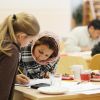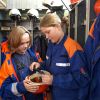Raising questions
Berlin is European Volunteering Capital 2021: An interview with Sawsan Chebli, Berlin’s state secretary for active citizenship

Fostering and further developing voluntary engagement at the local level – that is the idea behind the “European Volunteering Capital” award presented by the Centre for European Volunteering (CEV). In 2021 it was the German capital Berlin that won this accolade – and state secretary for active citizenship Sawsan Chebli explains what this means for the city.
Ms Chebli, you must be particularly pleased that Berlin won the European Volunteering Capital award…
Yes, it made me incredibly pleased and proud. On the one hand, the award acknowledges our work and pays tribute to the commitment shown by people in Berlin. At the same time, it obliges us not to rest on our laurels but to use this year to build on the active citizenship in our city.
Volunteering is in my view the expression of an intact community – especially in such unprecedented times as now.
How?
First, I believe it is important to stress that this year of action is not something that is run merely by politicians, but that is filled with life by the volunteers and organisations themselves. Berlin’s civil society cooperates on various topics in what are known as action forums, for instance. These have already begun and will continue until the end of the year. In addition, a wide range of workshops – in digital form, for now – will be on offer over the next few weeks and months, as will various discussion events. Our final event will then be celebrated on 5 December, which will see us pass the baton on to Gdansk, which will be the 2022 European Volunteering Capital.
A third of people in Berlin are engaged in some kind of volunteering. How important is this for the economy and for society?
It is vitally important. It is the volunteers who help keep this city alive. It is they who ensure the social cohesion of our society. Especially during the difficult times of the pandemic, it has become clear once again that many people are willing to devote their time selflessly for others. I am particularly keen to ensure that we also reach out to those target groups who have not yet found ways to get involved in volunteering, whose voices are rarely heard in societal debates, and who do not have a big lobby. We must open volunteering up to more people so that everyone has the chance to engage, take part in society and feel that they belong.
Volunteering was the first time I engaged more intensively with political issues.
Can democracy be strengthened through volunteering?
The motto of the year of action is “EntdeckeDasWirInDir” (DiscoverTheWeInYou) and I am convinced that the sense of community that goes hand in hand with volunteering plays an essential role in a thriving and resilient democracy – especially because we are experiencing a growing number of attacks on democratic values and seeing that trust in democracy is dwindling. Volunteering to help others and society is solidarity in action and strengthens our community, which in turn is one of the prerequisites for democracy.
Anyone wishing to do something to combat global injustice should start on their own doorstep.
How does volunteering work during a pandemic?
Like so many other things, volunteering has suffered from the restrictions put in place during the pandemic. At the same time, however, there have been many examples of how volunteers have achieved some great things and found new ways of being there for other people. Their tireless efforts in areas such as neighbourhood help, telephone helplines and vaccination centres have helped alleviate the effects of the crisis. I simply cannot thank the volunteers enough for this. We have done our best to support this impressive commitment, for example by setting up coordination centres for pandemic aid volunteers in every Berlin district. People in need of help can contact the centres and will be put in touch will volunteers who will support them. In addition, we have created a platform called “Digital Vereint” (Digitally United) to help civil society with the massive topic of digitisation. The pandemic has also revealed just how much support is needed in this area.
Further information: www.freiwilligenhauptstadt.berlin
Here three volunteers from Berlin tell their stories.


